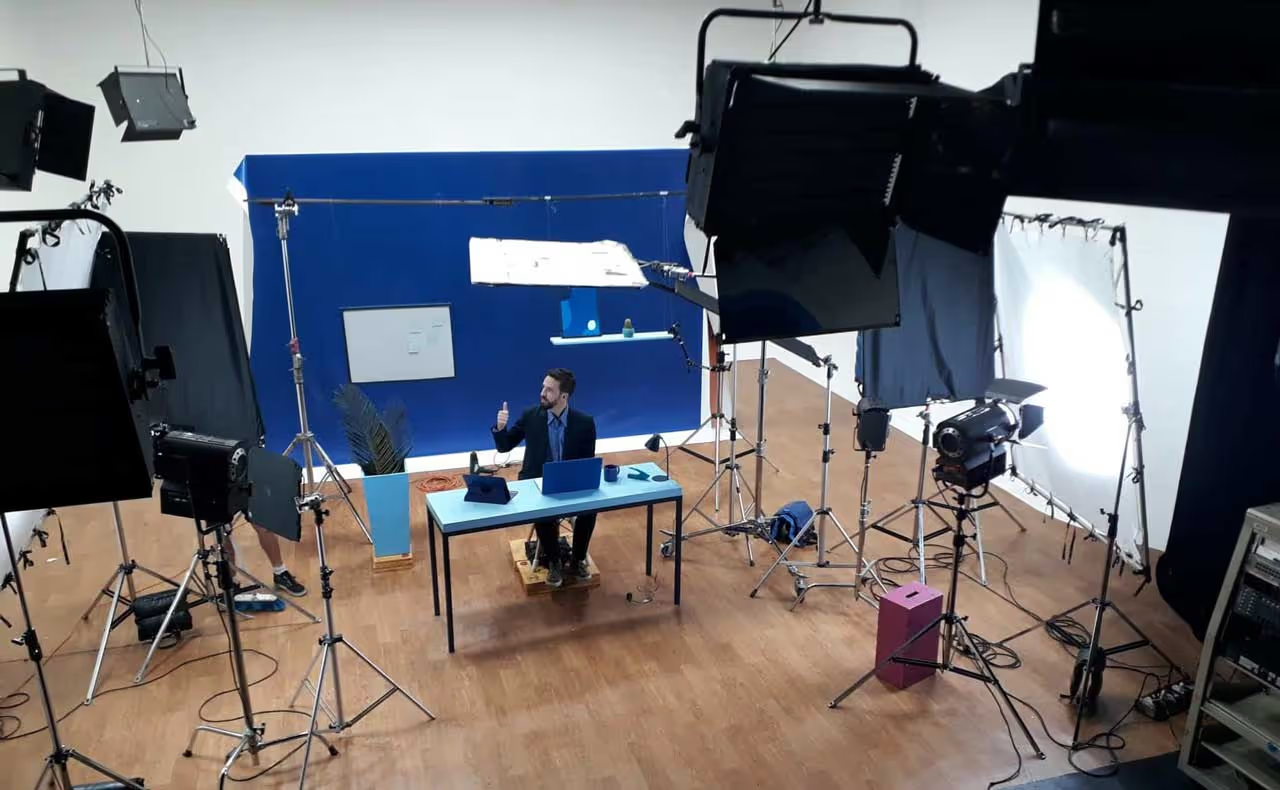Table of Contents
Roles and Responsibilities: Unveiling the Key Players in a Video Crew
If you have ever watched a movie or a TV show, you might have noticed that there are many names listed in the credits at the end. These are the people who work behind the scenes to make the video production possible. But who are they and what do they do? In this blog post, we will unveil the key players in a video crew and their roles and responsibilities.
A video shoot crew is a team of professionals who work together to create a video project, such as a film, a documentary, a commercial, or a music video. Depending on the size and scope of the project, video crews can have dozens or even hundreds of members, each with a specific function and expertise. However, there are some common roles that are essential for any video production. Here are some of them:
Producer
The producer is the person who oversees the entire video project from start to finish. They are responsible for securing the funding, hiring the crew, managing the budget, scheduling the shooting, and ensuring that the final product meets the expectations of the client or the audience. The producer is also involved in the creative aspects of the project, such as developing the concept, choosing the script, and selecting the cast.
Video Director
The director is the person who controls the artistic and creative vision of the video project. They work closely with the producer and the scriptwriter to shape the story and the style of the video. They also direct the actors, guide their performances, and collaborate with other crew members such as the cinematographer, the editor, and the sound designer to achieve their desired effect.
Camera Operator
A camera operator is responsible for operating the camera and capturing the shots that the director wants. They work closely with film crew, the director of photography (DP) and the camera department to set up the camera, adjust the focus, zoom, exposure, and other settings, and follow the action of the scene. They also collaborate with the sound department to ensure the audio and video are in sync. A camera operator needs to have a good eye for composition, lighting, and movement, and a technical knowledge of the camera equipment and software. They also need to be able to work under pressure, communicate effectively with the crew, and adapt to changing situations.
Production Assistant
A production assistant (PA) is a general assistant who helps with various tasks on a film set. They can be assigned to different departments, such as art, wardrobe, makeup, props, or locations. Their duties can include running errands, delivering messages, setting up equipment, distributing scripts, assisting cast and crew members, and cleaning up after each day's shoot. A PA needs to be flexible, reliable, hard-working, and willing to learn. They also need to have good organizational and communication skills, as well as a positive attitude. A PA is often an entry-level position that can lead to other opportunities in the film industry.
Digital Imaging Technician
A digital imaging technician (DIT) is responsible for managing the digital workflow of the footage captured by the camera. They work with the DP and the camera department to ensure that the footage is properly exposed, color-graded, backed up, and transferred to the post-production team. They also monitor the quality and consistency of the images on set and make adjustments if needed. A DIT needs to have a strong technical knowledge of the camera systems, software, and formats used on a film set. They also need to have a good eye for color and detail, as well as a problem-solving and creative mindset.
Audio Technician
An audio technician is a professional who works with sound equipment and audio systems to produce and enhance sound quality for various purposes. They may work in different sectors of the music industry, such as live sound, studio recording, post-production, or broadcasting. They are responsible for the setup, maintenance, testing, and troubleshooting of the equipment, as well as choosing the appropriate equipment for the type of space and sound source. They may also be called audio engineers, recording engineers, sound engineers, or studio engineers, depending on their specialization.
Assistant Director
An assistant director (AD) is responsible for managing the logistics and scheduling of a film shoot. They work with the director and the producer to plan the shooting schedule, coordinate the cast and crew members, oversee the safety and security of the set, and ensure that everything runs smoothly and on time. They also communicate with other departments, such as locations, transportation, catering, and extras casting. An AD needs to have excellent leadership and management skills, as well as a thorough knowledge of the script and the production process. They also need to be able to handle stress, multitask efficiently, and deal with unexpected challenges.
Scriptwriter
The scriptwriter is the person who writes the screenplay or the script for the video project. They create the story's dialogue, characters, and plot. They also provide instructions for how each scene should be shot and edited. The scriptwriter may work alone or with other writers and producers, depending on the complexity and length of the project.
Cinematographer
The cinematographer is the person who handles the camera and lighting for filming the video project. They work with the director to determine how each scene should look and feel, using different techniques such as camera angles, movements, lenses, filters, and lighting effects. They also supervise other camera operators and assistants who help them capture the footage.
Video Editor
The editor is the person who cuts and arranges the footage for the video project. They work with the director and the producer to create the video's final version, using different tools such as transitions, effects, music, and sound. They also ensure that the whole video content flows smoothly and coherently and that it matches the intended tone and pace.
Lighting Director
A lighting director is a creative professional who designs and implements the lighting for various types of productions, such as film, television, theater and broadcast media. A lighting director works with the director, the cinematographer and other crew members to create the desired mood, atmosphere and effects for each scene using different types of lighting equipment, special effects and electrical engineering strategies.
Sound Designer
The sound designer is the person who creates and manipulates the sound for the video project. They work with the director and the editor to enhance the mood and atmosphere of the video, using different elements such as dialogue, sound effects, foley, and background noise. They also mix and balance the sound levels to ensure that they are clear and consistent. These are just some of the key players in a video crew job, but there are many more roles that contribute to successful video production.
Each video crew's role requires a different set of skills, knowledge, training, and experience, and they all depend on each other to create a cohesive and quality video product. You can find professionals who are experienced and educated in each part of a video crew in Get Camera Crew! Contact us now and explore the power of video crews.
How to hire the best corporate video production team for your business?
Video production is a powerful way to showcase your brand, products, and services to your various clients and target audience. However, not all video production teams are created equal. How do you find the best one for your business needs? Here are some tips to help you make the right decision.
1. Define your goals and budget.
Before you start looking for a video production team, you need to have a clear idea of what you want to achieve with your video and how much you can afford to spend. Do you want to increase brand awareness, generate leads, educate customers, or entertain viewers? What is the message and tone of your video? How long and complex do you want it to be? How will you measure its success? These are some of the questions you need to answer before you contact any video production company.
2. Do your research.
Once you have your goals and budget in mind, you can start searching for potential video production teams online. Look at their websites, portfolios, testimonials, and reviews. Pay attention to their style, quality, creativity, and professionalism. Do they have experience in your industry or niche? Do they have any awards or recognitions? Do they have any references or case studies? You can also ask for recommendations from your network or use platforms like Upwork or Fiverr to find freelancers.
3. Compare and contrast.
After you have narrowed down your list of candidates, you need to compare and contrast them based on several criteria. Some of the factors you should consider are:
- Price: How much do they charge for their services? Do they offer any discounts or packages in the video production industry? Do they provide a detailed quote and a contract?
- Communication: How responsive and friendly are they? Do they listen to your needs and expectations? Do they ask relevant questions and offer suggestions?
- Process: How do they approach video production? What are the steps and timelines involved? How do they handle revisions and feedback?
- Equipment: What kind of equipment and software do they use? Do they have access to high-quality cameras, lighting, audio, and editing tools?
- Team: Who are the people behind the scenes? How many and what are their roles and qualifications? Do they work well together and with you?
4. Make a decision.
After you have evaluated all the options, you need to make a final decision based on your gut feeling and intuition. Choose the high-quality video production crew that best suits your goals, budget, style, and personality. Don't be afraid to negotiate or ask for clarifications if needed. Once you have made your choice, sign the contract and get ready for an amazing video production experience.
How to Hire Video Crews with Get Camera Crew
If you want to make videos for your business, you need a reliable and professional video production company that can deliver high-quality results at an affordable price. That's where Get Camera Crew comes in.
If you want to create company videos that will boost your business, contact Get Camera Crew today and get a free quote. We are ready to help you achieve your marketing goals with our video production services.






